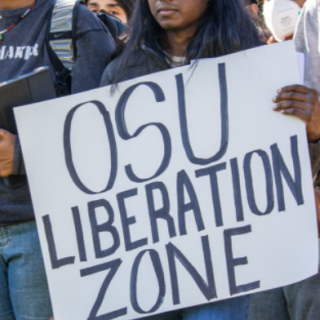Advertisement
If you’ve recently dined out, you’ve noticed that single-use plastic straws are disappearing. Many local Columbus restaurants have stopped providing straws to their customers, major franchises such as Starbucks and McDonalds have turned to alternatives, and cities across the country have outright banned the disposable utensils as a pollution prevention measure. These measures are portrayed as simple, easy changes in individual behavior that result in big wins for sustainability. Corporations are rewarded with brand loyalty from environmentally-conscious consumers.
Each year, over eight million tons of plastic enter our oceans. Plastic straws are only 0.025% of this waste. So why do we hear so much about their polluting effect - and what we as consumers must do about it - when there are clearly larger issues at hand?
This is not the first time corporate interests have misdirected ordinary people about the real sources of pollution. In fact, if you’ve ever calculated your “carbon footprint”, you’ve been influenced by one of the largest fossil fuel companies in the world. As part of an award-winning advertising campaign, British Petroleum (BP) launched their “carbon footprint calculator” in 2004, asking consumers to consider how their daily activities contributed to global emissions. BP seemed like an innovator among oil and gas companies at a time when “going green” increasingly occupied public conscience.
This campaign was a smashing PR success for a company that produces 1.5% of the world’s total greenhouse gas emissions. This marketing manipulation is cleverly three-pronged: Firstly, it sends the message to individuals that climate change is their responsibility to mitigate. Secondly, it boosts BP’s corporate image by creating a narrative that the company is environmentally-conscious and therefore altruistically-motivated. Thirdly, this good PR allows the company to evade deeper discussion about their role in climate change or environmental disasters.
Individuals are left to moralize about the environmental impact of their morning commute, consider adopting a low-carbon diet, and wrestle with guilt about travel for leisure. And BP? It is business as usual, with little attention drawn to their rescinded “Beyond Petroleum” rebrand or their half-hearted attempts to expand into renewables. As a 2021 New York Times article quips, “Worrying About Your Carbon Footprint Is Exactly What Big Oil Wants You To Do.”
Now examine how the messaging around consumer straw use detracts from corporations’ exponentially larger impact.
Starbucks’s “sippy cup” lids - which actually use MORE plastic - are applauded for reducing waste. A variety of airlines have discontinued the use of plastic straws and stirrers - while the airline industry collectively emits nearly a billion tons of CO2 per year.
Simply put, banning plastic straws is low-cost, low-effort, and doesn’t affect companies’ bottom lines. To their delight, the infinitesimal impact of opting for a disposable straw at a restaurant now conjures up visions of injured sea turtles, the Great Pacific Garbage patch, and the looming threat of increasingly ubiquitous microplastics. Consumers hear one thing: pollution (and thus, climate change) is happening because of the cumulative effect of irresponsible and ignorant personal choices - and you must sacrifice your right to basic sanitation and comfort in order to mitigate this impact.
It’s not a secret that paper straws don’t really work, and that “compostable” plastic straws end up in landfills most of the time anyway. Reusable plastic straws are incredibly unsanitary when not appropriately cleaned, and metal straws have resulted in injury and death. As disability rights advocates point out, bans on disposable plastic straws represent a tangible accessibility barrier for many disabled and elderly individuals. Even Disney has enacted bans, making life significantly harder for the young children their parks are designed for.
While companies virtue-signal an ethos of sustainability, their demonization of single-use necessities will eventually sour consumers’ perception of environmentalism. The Plastic Pollution Coalition names straw bans as a “gateway issue”. They believe that conversations about straws will make everyday people more aware of the effects of pollution and therefore more receptive to more drastic lifestyle changes. But if the average person comes to associate sustainability with sacrificing the right to basic sanitation or comfort - especially in a post-Covid world - they will frame environmentalism as a movement that seeks to senselessly limit basic amenities. The refusal to punish polluters ultimately punishes consumers. Asking consumers to make significant changes in behavior to mitigate their relatively minute impact - when the ultimate culprits get off scot-free - will ultimately discourage individuals from making any impactful choices available to them.
Reducing one’s environmental impact is an admirable - if often futile - effort. But the encouragement to do so shouldn’t come from major polluters hoping to pass their overwhelming guilt onto the relatively powerless consumer. It is an intentionally lazy and disingenuous attempt by corporations to increase their ESG scores without changing business models or threatening shareholder profit. The public has fallen for this before in the form of carbon footprints and “green” brands - it doesn’t need to happen again.



